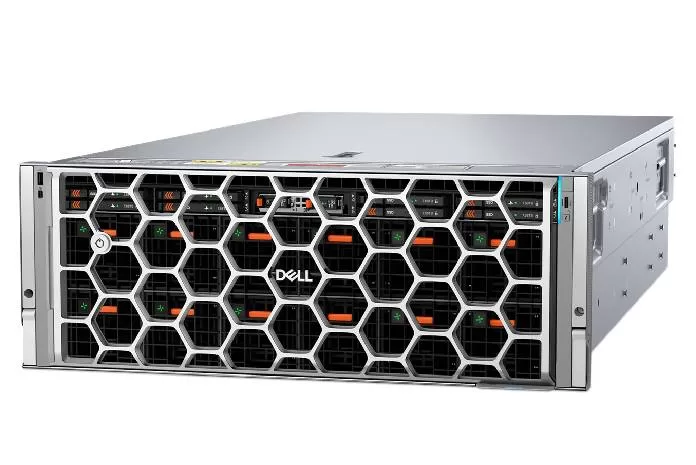Dell Technologies continues to make enterprise AI adoption easier with the Dell AI Factory, expanding the world’s broadest AI solutions portfolio.1 Powerful new infrastructure, solutions and services accelerate, simplify and streamline AI workloads and data management.
“Getting AI up and running across a company can be a real challenge,” said Arthur Lewis, president, Infrastructure Solutions Group, Dell Technologies. “We’re making it easier for our customers with new AI infrastructure, solutions and services that simplify AI deployments, paving the way for smarter, faster ways to work and a more adaptable future.”
New AI infrastructure offers high-density, efficient compute and eases access to data to power AI workloads
Introduced earlier this year, the Dell Integrated Rack Scalable Systems (IRSS) program is a turnkey factory integration program that delivers fully loaded, plug-and-play rack-scale systems with Dell Smart Cooling. IRSS further simplifies deployment of energy efficient AI infrastructure with one-call service and support options for the entire rack. Once set up, Dell takes care of the packaging waste and recycling, and can help with responsible recycling of your old hardware.
Dell has expanded the program to include the Dell PowerEdge XE9685L and Dell PowerEdge XE7740 servers in the standard 19-inch Dell Integrated Rack 5000 (IR5000). The Dell IR5000 is designed for high-density applications in a space-efficient form factor, and delivers high performance without compromising on energy efficiency.
⦁ The Dell PowerEdge XE9685L is a dense, 4U liquid-cooled server designed for AI, machine learning, high performance computing (HPC) and other data-intensive workloads. The dual 5th Gen AMD EPYC™ CPUs paired with the ⦁ NVIDIA HGX H200 or B200 platforms, along with up to 12 PCIe gen 5.0 slots, offer customisable configurations to meet specific compute needs, optimised storage connectivity and maximum IO throughput for demanding workloads. This platform offers industry-leading GPU-density with up to 96 NVIDIA GPUs per rack.
⦁ The 4U air-cooled Dell PowerEdge XE7740 uses dual Intel® Xeon® 6 with P-cores and up to 8 double-wide accelerators, including Intel Gaudi® 3 AI accelerators or ⦁ NVIDIA H200 NVL, or up to 16 single-wide accelerators, such as the ⦁ NVIDIA L4 Tensor Core GPU. This flexibility allows enterprises to right-size their server configuration for the workload at hand, from fine-tuning or inferencing generative AI models, to extracting value from large datasets.
Dell plans to support the upcoming NVIDIA GB200 Grace Blackwell NVL4 Superchip with a new Dell PowerEdge XE server designed for the Dell IR7000, supporting up to 144 GPUs per rack in a 50OU standard rack. The IR7000 rack supports large-scale HPC and AI workloads requiring high power and liquid cooling with the ability for near 100% heat capture.
Updates to the Dell Data Lakehouse provide enterprises with modern architectures for efficiently managing and analysing data for AI tasks. This platform is built on AI-optimised hardware and a full-stack software suite, and will expand to include Apache Spark for distributed data processing at scale. For businesses managing massive data volumes, the new Spark integration will provide significant efficiency gains, with a unified approach for data analytics, management, processing and analysis for faster, more actionable insights.
“The continued reimagining and improvement of AI and HPC technologies is critical to accelerating discoveries across industries,” said Dan Stanzione, executive director, Texas Advanced Computing Center (TACC). “With Dell’s AI solutions we are building complex HPC systems that allow innovation to thrive in research communities. Ultimately, these advances have the potential to reshape society and drive progress that benefits everyone.”
Leading AI partner ecosystem solutions turbocharge AI adoption
Dell is collaborating with partners across the AI ecosystem to power and simplify AI deployments:
⦁ Updates to the Dell AI Factory with NVIDIA deliver accelerated performance and reduced time-to-outcomes for AI operations and use case deployment. The NVIDIA HGX H200 and H100NVL support options provide up to 1.9x higher performance over NVIDIA HGX H100.
⦁ Dell Agentic RAG with NVIDIA, part of the Dell AI Factory with NVIDIA, allows customers to perform complex queries and accelerate their retrieval augmented generation (RAG) operations. The design helps organisations with large data sets use AI agents to improve RAG workflow performance, handle complex queries and deliver higher quality outcomes. The solution leverages Dell PowerEdge, Dell PowerScale and NVIDIA AI Enterprise software and generative AI tools including ⦁ NeMo Retriever microservices and the NVIDIA AI Blueprint for multimodal PDF data extraction.
⦁ Dell Validated Designs for AI PCs are open-source guides designed to boost the development of AI applications on Dell AI PCs with NPU technology. Developers can easily customise the modular designs to integrate features like LLMs, vision, text and speech into applications. They can deploy the AI applications across multiple platforms, regardless of silicon. With this scalable approach, businesses can automate routine processes, save time, reduce costs and improve data security with on-device AI.
Reduce complexity and ease AI adoption with Dell Services
Finding talent to develop strategies and implement AI continues to be a challenge for organisations. Dell Professional Services help organisations reach their AI goals more efficiently with:
⦁ Advisory and Implementation Services for Sustainable Data Centers provide the expertise to create and implement strategies designed to improve energy efficiency which can help lower emissions in the data center with intelligent power and cooling management to help customers achieve their sustainability goals.
⦁ Data Management Services deliver an AI-ready catalog by discovering, classifying and refining data, giving organisations simplified access to organized, high-quality data.
⦁ Design Services for AI Networking provide customers with a network design optimised for AI workloads that delivers faster speeds, reduced latency and enhanced scalability.2
⦁ Implementation Services for ServiceNow Now Assist integrate GenAI capabilities into service management workflows via Now Assist, which streamlines content gathering through AI-driven summaries to automate outcomes and improve productivity.
“Enterprises are pursuing AI to remain competitive in today’s digital landscape but they need to harness their proprietary data to differentiate,” said Dave Vellante, chief analyst, theCUBE Research. “We’re seeing a resurgence in interest for offerings like Dell’s AI infrastructure, solutions and services that can help customers prepare their data to extract insights, automate tasks and transform processes. As we continue into this new era of technological innovation, it will be critical for enterprises to continuously learn and invest in innovation to realise the benefits AI promises.”n


















